 Important Notice:
Important Notice:
This conference will be rescheduled. More Information TBA once COVID-19 social isolation measures have been lifted.
Presented by Eboni Webb, Psy.D., HSP and Robert Weiss, Ph.D., LCSW, CSAT and John Briere, Ph.D. and Robert T. Muller, Ph.D., C. Psych. and Jennifer Sweeton, Psy.D., M.S., M.A. and Zachary Walsh, Ph.D. and Darryl S. Inaba, PharmD., CATC-V, CADCIII, co-author of Uppers, Downers, All-Arounders and Stanton Peele, Ph.D., author of The Truth About Addiction and Recovery
Wednesday, May 27, 2020 – Friday, May 29, 2020 | Edmonton, ab
This conference will be rescheduled. More Information TBA once COVID-19 social isolation measures have been lifted.
Wednesday, May 27, 2020 – Friday, May 29, 2020
8:30am – 4:00pm
DoubleTree by Hilton West Edmonton
16615 109th Ave NW, Edmonton, AB
phone: 780.484.0821
This conference will be rescheduled. More Information TBA once COVID-19 social isolation measures have been lifted.
Many of the presenters in this conference now have online courses available. For more information please visit webinars.jackhirose.com.
If you are currently registered for this conference and would like to switch to an online course please email office@jackhirose.com to be transferred.
Clinical Professionals: All mental health professionals including, but not limited to Clinical Counsellors, Psychologists, Psychotherapists, Social Workers, Nurses, Occupational Therapists, Hospice and Palliative Care Workers, Youth Workers, Mental Health Workers, Addiction Specialists, Marital & Family Therapists, Speech Language Pathologists, Vocational Rehabilitation Consultants, School Counsellors, Behaviour Specialists, Rehabilitation Consultants, Geriatric Specialists, and all professionals looking to enhance their therapeutic skills.
8:30am - 4:00pm May 27, 2020
COURSE DESCRIPTION:
Brain imaging and other more recent research tools continue to discover variances in neuro-cellular, neuro-chemical, and neuro-functioning that underlie a vulnerability to develop substance-related and other addictive disorders. The brain anomalies associated with addictive disorders provide an understanding of the differences between the wide variety of drugs and behavioural compulsions. They also help to explain why some are more likely than others to relapse after treatment for their compulsive drug use or behaviours. The rapidly expanding field of Addiction Medicine provides new insights on preventing, assessing and treatment of addictions and related disorders. It is also providing more evidenced-based resources to better manage those struggling with these major mental health disorders. This presentation will explore the evolving science of Addiction and Recovery to dispel the undue stigma associated with Substance Related and Addictive Disorders. It will also offer an introduction to the new resources in development to treat these disorder and the evolving medical specialty of addiction medicine.
COURSE GOALS:
COURSE OBJECTIVES:

Dr. Darryl Inaba is Director of Clinical and Behavioural Health Services for the Addictions Recovery Centre and Director of Research and Education of CNS Productions in Medford, Oregon. He is an associate Clinical Professor at the University of California in…
More information: www.cnsproductions.com/46.html
8:30am - 4:00pm May 27, 2020
COURSE DESCRIPTION:
Many of the clients that we serve have such complex problems due to extensive trauma and attachment disturbances. These early wounds have informed their adult presentations resulting in mental illness and personality disorders. The poet William Wordsworth wrote in his poem, My Heart Leaps Up When I Behold (1802), “..the Child is father of the Man.” Future pioneering psychologists would be inspired by this passage as they came to understand that both function and dysfunction are born in childhood and guide us in our adult lives.
In this course you will come to understand the impact of trauma on the developing mind and how attachment is formed or lost through traumatic events. You will learn how the brain is organized through healthy attachment and the critical elements of healthy attachment. We will examine the current neuroscience behind both trauma and attachment and the top evidence-based strategies to address key DSM-V disorder through the lens of trauma.
COURSE OBJECTIVES:
COURSE OUTLINE:
Neurological Building Blocks
Defining trauma and attachment
Trauma and Brain Development
Common survival resources
Relational Character Strategies and the DSM-V
Critical Interventions

Eboni Webb, Psy.D., HSP is a licensed psychologist and serves as an advisor to the Dialectical Behavior Therapy National Certification and Accreditation Association (DBTNCAA). She has practiced in numerous community settings including clinics that treat underserved communities of color, clients with…
8:30am - 4:00pm May 27, 2020
COURSE DESCRIPTION: 8:30am – 12:00pm – Understanding the Diagnosis of Sexual Compulsivity/Addiction
Author/Educator/Sexologist Rob Weiss Phd., LCSW will open this discussion with the recent World Health Organization (ICD-11) diagnosis of Compulsive Sexual Behaviour Disorder (CSBD) and its relationship to what we have typically called sex and/or porn addiction. The various myths surrounding sexual compulsivity/ addiction (what it is and what it isn’t) will be clarified, as he reviews typical types of sexual acting-out behaviours and the related consequences that are most indicative of sexual compulsivity/addiction. Technology and sex will be discussed in all forms, including hook-up apps, live AR/VR sex, along with the evolving problem of porn addiction in younger people. We will review common addiction terms as applied to sex like powerlessness and unmanageability as well as the addictive power of sexual fantasy. The talk will explore the oft underlying trauma and attachment deficits that unconsciously propel these types of adult intimacy disorders, helping attendees to understand sex addiction/compulsivity as an intimacy disorder, and not simply a sex issue. Common treatment plans will be reviewed along with basic goals of early treatment. Resources for client and future clinician education will be provided.
COURSE DESCRIPTION: 1:00pm – 4:00pm – Prodependence: A new, attachment-focused treatment model for loved ones of addicts
Abstract: Prodependence is the first attachment-based model for the treatment of addict’s partners and loved ones. The model moves beyond the trauma and deficit-based theories of codependency and co-addiction, allowing us to view this population with strength-based eyes and fresh ideas. Prodependence is more invitational, less pathological, and more personally affirming to those who are intimately involved with addicts, as Prodependence neither assumes or assigns any pathology or label to people simply because they are loving a troubled person to the best of their ability. The past 35 years have brought endless new, useful, and cutting edge treatments to the addiction space (Smart Recovery, EMDR, trauma work, somatic, equine therapies, and more) — all to foster better outcomes for our addicted clients. But when it comes to the treatment of an addict’s partner and loved ones, we have seen little new thought since the concept of codependency was first fleshed out over three decades ago. Now is the time for more compassionate and practical, clinically sound, tested treatment models be brought to life.
COURSE OBJECTIVES: 8:30am – 12:00pm
COURSE OBJECTIVES: 1:00pm – 4:00pm
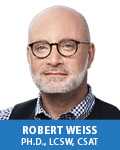
Robert Weiss Ph.D., LCSW, CSAT is a digital-age intimacy and relationships expert specializing in infidelity and addictions—most notably sex, porn, and love addiction. Author; Sex Addiction 101, Out of The Doghouse: A Step-by-Step Relationship-Saving Guide for Men Caught Cheating and…
8:30am - 4:00pm May 28, 2020
COURSE DESCRIPTION:
Harm Reduction — which recognizes and builds on the fluidity of humans and their ability to change — is the opposite of the disease theory. And while significant cracks have begun to appear in the disease theory’s dominance in North America, remarkably, harm reduction thinking often accepts fundamental disease theory conceptions — primarily that addiction occurs simply as a result of exposure to opioids, is NOT impacted by social setting, and is irreversible. Dr. Peele deploys data, common sense, and the audience’s personal experience to show how wrong-headed — and dangerous — this disease theory residue is, while he presents an alternative way of thinking and treatment. Trauma theory is discussed in this regard.
COURSE OBJECTIVES:
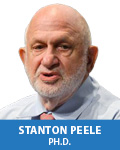
Stanton Peele, Ph.D. has been at the cutting edge in addiction theory and treatment and drug policy for fifty years. His seminal work began with his 1975 book, Love and Addiction (with Archie Brodsky), and extends to his 15th book,…
8:30am - 4:00pm May 28, 2020
COURSE DESCRIPTION:
Cannabis is already part of the lives of many Canadians, and all health professionals who work with individuals who use cannabis or are cannabis-curious.
Spend a day learning: What is THC? CBD ? Sativa? Indica? The many combinations? What’s recreational? What’s medical? Methods of delivery? When is it a problem? What’s for sale at the dispensary, the clinic or on the street? What are the questions to ask clients? What are the risks and benefits for anxiety, depression, trauma & psychosis?… and a lot more.
Understanding the new cannabis landscape will help you to successfully engage with clients; to know how to question and explore cannabis use. This workshop will help you into leading edge research and lots of information you never learned in school.
Zach Walsh is a Canadian psychologist and a leader in the field of cannabis and mental health.
Drawing from his own research, clinical experience and the latest empirical literature, he will discuss all you need to know about cannabis use in relation to mental health, cognition and well-being. You will learn about the risks and benefits for common mental health disorders, how cannabis use affects brain functioning as well as how to assess when cannabis use is a potential problem and more.
COURSE OBJECTIVES:
COURSE OUTLINE:
9:00am – 10:30am: Cannabis science 101 – cannabis history, constituents, and products. Introduction to the endocannabinoid system
10:45am – 12:00pm: Medical cannabis in Canada – the hows and whys of the medical program in Canada, overview of patients experiences, cannabis for pain
1:00pm – 2:30pm: Cannabis and mental health – PTSD, anxiety, depression, addiction, psychosis and problematic use
2:45pm – 3:45pm: Cannabis research – PTSD case study, whats ongoing & whats next
3:45pm – 4:00pm: Mindful cannabis use & wrap up questions
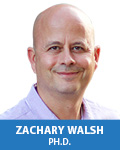
Zachary Walsh, PhD, is an Associate Professor in the UBC Department of Psychology and Director of the Therapeutic, Recreational and Problematic Substance Use lab at UBC. Having completed a clinical internship and a research fellowship at the Brown University Centre…
More information: blogs.ubc.ca/walshlab/
8:30am - 4:00pm May 28, 2020
COURSE DESCRIPTION:
Over the past couple of decades there has been an exciting merging of psychotherapy and neuroscience research that is revolutionizing clinical practice. Cognitive, affective, and social neuroscience research provides profound insight into the brain changes humans are capable of producing, as well as how childhood trauma (such as ACEs), and trauma more broadly, may negatively impact the brain. We are beginning to learn, through neuroscience research, how the brain can change with the practice of psychotherapeutic techniques that target and improve the functioning of specific brain structures. This seminar, led by clinical expert Dr. Jennifer Sweeton, shares the most up-to-date research discoveries on the neuroscience of childhood trauma, addiction, and PTSD, and teaches highly effective psychotherapy techniques clinicians can begin using tomorrow to help clients recover.
COURSE OBJECTIVES:
COURSE OUTLINE:
9am: Start
9-10:30am: ACES, and the neuroscience of trauma and developmental trauma
10:30-10:45am: Break
10:45-12pm: Neuroscience of addiction; Neuroplasticity and how therapy can change the brain
12-1: Lunch
1-2:30pm: Bottom-up techniques for trauma and addiction recovery
2:30-2:45pm: Break
2:45-4pm: Top-down techniques for trauma and addiction recovery
4pm: End

Jennifer Sweeton, Psy.D., M.S., M.A. is a licensed clinical psychologist, best-selling author, and internationally-recognized expert on anxiety and trauma, women’s issues, and the neuroscience of mental health. She is the author of the book, Trauma Treatment Toolbox, published by PESI…
More information: www.jennifersweeton.com/
8:30am - 4:00pm May 29, 2020
COURSE DESCRIPTION:
Survivors of trauma and early attachment disturbance are at elevated risk of a variety compulsive and self-endangering behaviours, ranging from suicidality and self-injury to substance abuse, indiscriminate sexual activities, and binge eating. Many of these difficulties are seen as symptoms of a personality disorder, behavioural addiction, or impulse control disorder. However, emerging research indicates that they are more accurately understood as coping/homeostatic responses to triggered childhood memories and inadequate emotional regulation capacities.
Calling on his upcoming book Triggered: An Integrated Approach to Trauma, Attachment Disturbance, and Risky Behaviour (Guilford), John Briere presents an innovative, integrated approach to self-endangering behaviour, the compensatory avoidance model. Drawing on new research on memory reconsolidation, implicit processing, and revisions to habituation theory, this treatment system directly targets the memory/dysregulation dynamic, with interventions such as emotional regulation training; mindfulness, metacognitive awareness, and emotion surfing procedures; sequential memory processing; in vivo treatment of implicit memory activations; and harm reduction.
A new treatment component, trigger management, increases client autonomy, resilience, and problem-solving. Approaches to three risky behaviours will be presented in detail: self-injury, risky sexual behaviour, and bingeing and purging. Attendees will be provided with newly developed worksheets and assessment instruments that organize and inform the treatment process.
COURSE OBJECTIVES:
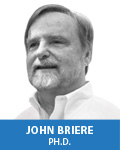
John Briere, Ph.D., is an Associate Professor of Psychiatry and Psychology at the Keck School of Medicine, University of Southern California, and Director of the USC Adolescent Trauma Training Center of the National Child Traumatic Stress Network. A past president of…
8:30am - 4:00pm May 29, 2020
COURSE DESCRIPTION:
This practical workshop, led by Dr. Robert T. Muller, a leading expert on trauma therapy and globally-acclaimed author of the psychotherapy bestseller: Trauma & the Avoidant Client–is aimed at building your understanding of the psychotherapeutic relationship with challenging clients, particularly trauma clients. All clients present with some degree of traumatic affect, making this workshop suitable for all practitioners.
While many of us try to maintain a good therapeutic relationship, this can be difficult. Trauma clients struggle to trust the therapist; many minimize their own traumatic experiences, or become help-rejecting. Others rush into the work, seeking a “quick fix,” despite a long history of interpersonal trauma.
Through the lens of attachment theory, using a relational, integrative approach, Dr. Muller follows the ups and downs of the therapy relationship with trauma survivors. How do we tell when we’ve unknowingly compromised safety in the relationship? What happens to the relationship when clients or therapists rush into the process, and how can this be addressed? And how can subtle conflicts in the relationship become useful in treatment? Dr. Muller points to the different choices therapists make in navigating the relationship. In trauma therapy, those choices have a strong impact on outcome.
Recovering from trauma is a complicated process. When people reveal too much, too soon, they may feel worse. The pacing of therapy is critical. Here too, the key is in the therapist-client relationship. Dr. Muller walks you through the relational approaches that help pace the process of opening up – so that people find the experience helpful, not harmful.
Throughout the workshop, theory is complemented by case examples, practical exercises, and segments from Dr. Muller’s own treatment sessions. This workshop focuses on clinical skills that are directly applicable in your work as therapists. You will learn specific skills to ensure ethical practice with all clients.
COURSE OUTINE:
COURSE OBJECTIVES:
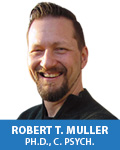
Robert T. Muller, Ph.D., C.Psych. is on faculty as a Full Professor of Clinical Psychology at York University, is a Fellow of the International Society for the Study of Trauma & Dissociation (ISSTD); and both of his books have won…
May 29, 2020
| Registration | Early bird Fee | Regular Fee |
|---|---|---|
| Individual 1 Day Enrollment | $249 | $269 |
| Individual 2 Day Enrollment | $449 | $469 |
| Individual 3 Day Enrollment | $639 | $659 |
| Group 3-7 | $619 | $639 |
| Group 8-14 | $599 | $619 |
| Group 15+ | $579 | $599 |
| Full-Time Student | $579 | $599 |
All fees are in Canadian dollars ($CAD).
Fees do not include applicable taxes (5% GST).
Early bird cutoff date: May 13, 2020
The early bird date has passed. Regular rates apply.
Please review our Registration Terms and Conditions for information on our cancellation policy, payment policies, rebates, and more. You must agree to our Terms and Conditions to register for a workshop or conference.
Register Online Download Registration Form (.PDF) Register your Group
All brochures and forms are provided in .PDF format.
If you are unable to open our files, we recommend downloading Adobe Reader for free.
Exhibitors are welcome at this event. We are pleased to offer sponsorship opportunities to businesses and organizations that provide services related to nursing, psychotherapy, addictions treatment, counselling, marriage & family therapy, psychology and other related fields.
→ More information
16615 109th Ave NW, Edmonton, AB
phone: 780.484.0821
Our rates:
To make a reservation over the phone, please call 780.484.0821 or 1.800.661.9804
Delux 2 Queen: $169.00 per night plus tax
1 King Suite: $194.00 per night plus tax
*please note, room reservations are subject to availability*
Please keep in mind when booking Jack Hirose and Associates corporate guest rooms, reservations booked for most hotels can be cancelled within 48 hours . If you are booking guest rooms through third party websites in many instances the reservations booked cannot not be cancelled.
When booking hotel rooms, ask for the Jack Hirose and Associates corporate rate. To receive our corporate rate, rooms must be booked one month prior to the workshop date. Please keep in mind hotel rates may fluctuate.
Jack Hirose & Associates is approved by the Canadian Psychological Association to offer continuing education for psychologists. Jack Hirose & Associates maintains responsibility for the program.
† The Alberta College of Social Workers (ACSW) and the Newfoundland and Labrador Association of Social Workers (NLASW) accept CPA-approved CEUs.
* Participants will receive a certificate of completion after every workshop. Workshops are pre-approved for 5.5 or 6 credits per day unless otherwise specified.
* Please contact your accrediting body for more information on individual association requirements.
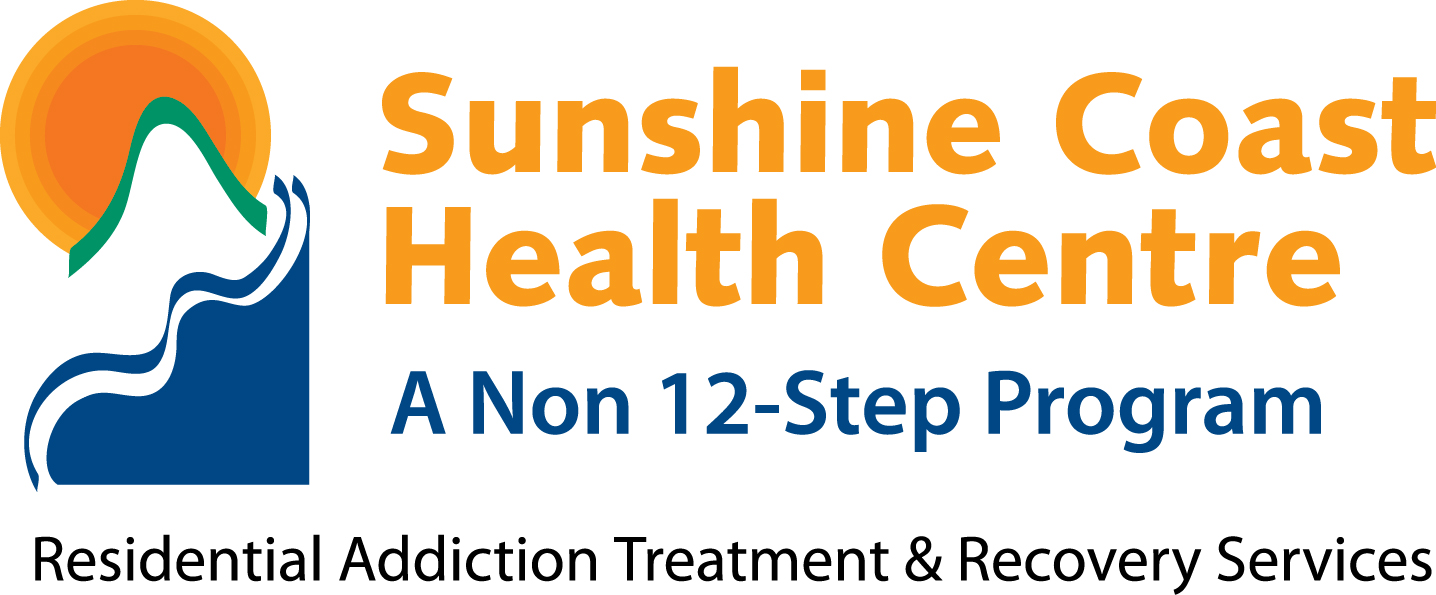
There are no related events at this time.